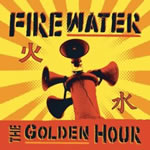|
|
 |
Dusted Reviews
Artist: Firewater Album: The Golden Hour Label: Bloodshot Review date: May. 6, 2008 |

|
|
|
 |
In 2005, after his marriage collapsed and Jetset Records shit the bed, Firewater braintrust Tod Ashley began a journey through “the places my country was bombing,” taking along his laptop. Along the way, he recorded songs with groups of local musicians, which often became chaotic improv sessions because of the language barriers involved. He became ill and had to forsake much of his ambitious itinerary, but he brought back tracks recorded in India, Pakistan, Turkey and Israel. Those songs comprise The Golden Hour, a record of his travels that’s the most diverse and conflicted piece in his catalogue.
Instead of his usual gang of polymaths who can play in six genres at once, here Ashley collaborates with masters of their particular traditions. Thus, the songs are much more anchored, less brazenly and irreverently experimental and more grounded in the rhythms and vocabulary of their respective source material. Thus, while the old Firewater might have played mournful Hungarian folk music over frantic Bollywood backbeats just for giggles, this one plays tight and straight. “These ones,” rather.
For it’s the work of 13 different bands, few of which share the language of their ad hoc frontman. It could have easily sounded like a fanciful mixed tape, or an unusually dark Sun City Girls record. It’s a testament to the strength of Ashley’s reality, and more importantly his adaptability, that the album holds together at all. Although it draws on half a continent’s worth of source material, The Golden Hour still bears, at every turn, the dark, swaggering cynicism that has always defined Firewater. He still deals in kitschy metaphors, but here, Ashley seems determined to mine the pain behind the shtick. (See “This Is My Life.”)
Predictably, a few of the songs address American politics, and those (particularly the marching-band stomper “Hey Clown”) find Ashley without much to say. It’s hard to fault his rage, and it’s hard to imagine how much more creative he might have gotten with it at this late stage of the W era. He’s much more interesting when he explores the vulnerability of the traveler, and confronts the problems that his narrators’ acidic worldview can cause them when they don’t know the translation for “Camel Wides.” More than before, the lyrics avoid smart-ass fatalism for the pleasures of naïve disorientation (“Six Forty Five,” “Paradise,” “Weird to Be Back”). He doesn’t dwell on his broken marriage explicitly, but one feels the post-traumatic agony of a man who ran away as quickly as possible and isn’t quite sure where the fuck he is now. The album’s most evident theme is kindness (“Some Kind of Kindness,” “A Place Not So Unkind”): the hope for it, the need for it, the lack of it in much of the world. From a man who once seemed like the sum of his gritty, unforgiving influences, it’s a haunting and vulnerable viewpoint.
By Emerson Dameron
|







